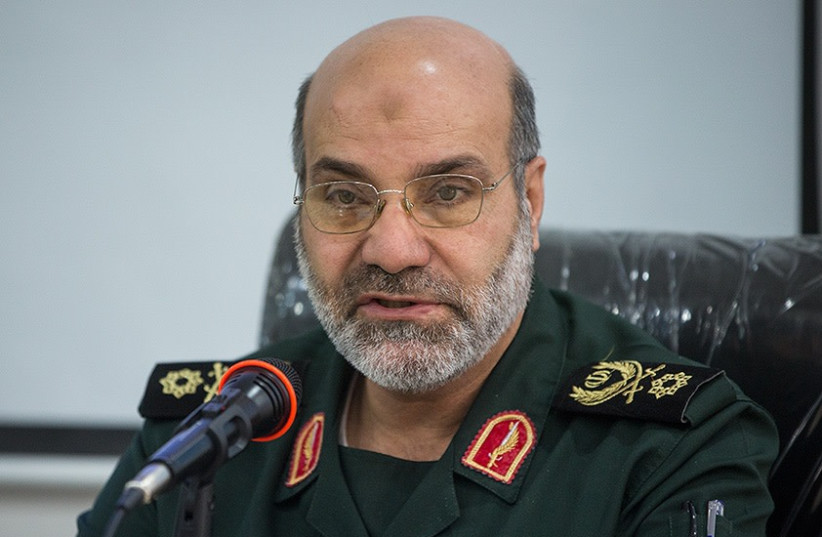“The Iranians don’t love dying, but it is very easy for them to send others to die,” then education minister Naftali Bennett said at the Herzliya conference in 2018.
“While we're shedding blood fighting their tentacles, the octopus's head is lounging in its chair enjoying itself,” Bennett continued. The time had come, he declared, for Israel “to aim at the head of the octopus and not its tentacles.”
Israel, according to foreign reports and Iranian accusations, did just that on Monday, killing Islamic Revolutionary Guard Corps (IRGC) commander Mohammad Reza Zahedi in Damascus. Zahedi was the most senior Iranian official killed since the American strike on IRGC Quds force commander Qassem Soleimani in 2020.
The Wall Street Journal termed the killing of Zahedi “the first real price” that Iran has paid “for its proxy warfare in the Middle East.”
In other words, going for the head of the octopus.

Along with Zahedi -- who was in charge of Iran’s operations in Syria and Lebanon, as well as coordinating with its militias in Iraq -- his deputy commander, his chief of staff, and four other IRGC officers were killed in the brazen strike on a building adjacent to the Iranian embassy located in Damascus’ diplomatic center.
Iran, involved in the bombing of the Israeli embassy in Buenos Aires in 1992 that killed 29 and injured 242, said Monday’s attack in Damascus was on its “consulate” and was a breach of international conventions and norms. The Iranian UN mission said the attack was a violation of "the foundational principle of the inviolability of diplomatic and consular premises.”
Israeli officials were quoted in the international media as saying the building was an IRGC outpost and therefore a valid military target.
Zahedi, along with being the most senior Iranian officer in Syria and Lebanon, was also in charge of Iranian efforts to smuggle arms to Palestinian terrorists in the West Bank, via Syria and Jordan. Just last week the IDF and Shin Bet announced that Israel had broken up an IRGC-linked network to smuggle advanced weaponry into the West Bank.
While Israel did not take responsibility for Monday’s attack, Defense Minister Yoav Gallant hinted broadly at it during a meeting with the Knesset’s Foreign Affairs and Defense Committee on Tuesday.
“We are currently in a multi-front war – we see evidence of this every day, including over the last few days,” he said. “We operate everywhere, every day, in order to prevent our enemies from gaining strength and in order to make it clear to anyone who threatens us – all over the Middle East – that the price for such action will be a big one.”
Not the first assassination of an Iranian officer this war
This is not the first time that an Iranian officer has been targeted since the beginning of the war, but it is the highest-ranking Iranian officer, and his assassination sends a message to Iran and Hezbollah both of Israel’s intent and capabilities.
The capabilities are clear. The ability to hit this building in a precision strike in full daylight in the middle of Damascus when Iran’s chief officer in charge of operations in Lebanon and Syria is meeting with his deputy and top officers shows that Israel’s intelligence services -- if Israel did indeed carry out the attack -- -- remain razor-sharp.
That is something important for Israelis to see, as well as Israel’s enemies, who both may have concluded following the colossal intelligence failure that preceded October 7 that the country’s intelligence capabilities are no longer what they once were. This type of attack shows that conclusion to be false. For Israelis this helps restore their confidence, while for Israel’s enemies, this reinforces deterrence.
The attack also sends a clear signal of intent that Israel is willing to do what Bennett called for some six years ago: take the fight directly to the Iranians, to the head of the octopus.
In the 10 years that Israel has been engaged in military action in Syria to keep Iran from becoming entrenched there and keep it from turning the Syrian Golan Heights into a launching pad for attacks against Israelis similar to what Hezbollah has done in southern Lebanon, Israel has taken pains to refrain from killing Iranian officers.
It has targeted numerous sites -- including weapons convoys and depots -- but for the most part was careful not to kill IRGC operatives.
That reticence ended with October 7 and Iran’s active involvement in trying to hit at Israel from numerous different directions: from the north through Hezbollah in Lebanon, from the east using Iranian-backed militias in Iraq (responsible for a drone attack on a naval base in Eilat on Sunday), and from the south via the Houthis.
Since December, Iran has admitted that more than 10 IRGC officers have been killed by alleged Israeli strikes in Syria.
The most prominent was the killing on December 23 in a Damascus suburb of Seyed Radhi Mousavi, in charge of the IRGC’s logistics and military coordination in the Levant, meaning the transfer of Iranian weapons to Syrian and Hezbollah. In January, five IRGC officers were killed in a strike in Damascus, including the Quds deputy intelligence head in Syria.
Monday’s strike on Zahedi sends the message that no one -- even the most significant Iranian military official in the region -- is immune, and that Israel’s policy now is to extract a heavy price from Iran itself, and not only from its proxies, for continued attacks on Israel
